It's been about a year and a half since I wrote The Road to VR, and a … few … things have happened since then.
-
Facebook bought Oculus for a skadillion dollars
-
I have to continually read thinkpieces describing how the mere act of strapping a VR headset on your face is such a transformative, disruptive, rapturous experience that you'll never look at the world the same way again.
I am somewhat OK with the former, although the idea of my heroes John Carmack and Michael Abrash as Facebook employees still raises my hackles. But the latter is more difficult to stomach. And it just doesn't stop.
For example, this recent WSJ piece. (I can't link directly to it, you have to click through from Google search results to get past the paywall).
I’ll spare you the rapturous account of the time I sculpted in three dimensions with light, fire, leaves and rainbows inside what felt like a real-life version of a holodeck from “Star Trek.” Writing about VR is like fiction about sex—seldom believable and never up to the task.
If you really want to understand how compelling VR is, you just have to try it. And I guarantee you will. At some point in the next couple of years, one of your already-converted friends will insist you experience it, the same way someone gave you your first turn at a keyboard or with a touch screen. And it will be no less a transformative experience.
I don't mean to call out the author here. There are a dozen other similarly breathless VR articles I could cite, where an amazing VR wonderland is looming right around the corner for all of us, any day now. And if you haven't tried it, boy, you just don't know! It can't be explained, it must be experienced! There are people who honestly believe that in 5 years nobody will make non-VR games any more. The hype levels are off the charts.
Well, I have experienced modern VR. A lot. I've tried both the Oculus DK1, the Oculus DK2, and a 360° backpack-and-controllers Survios rig, which looks something like this:
Based on those experiences, I can't reconcile these hype levels with what I felt. At all. Right now, VR is not something I'd unconditionally recommend to a fellow avid gamer, much less a casual gamer.
To be honest, when I tried the DK1 and DK2, after a few hours of demos and exploration, I couldn't wait to get the headset off. Not because I was motion sick – I don't get motion sick, and never have – but because I was bored. And a little frustrated by control limitations. Not exactly the stuff transformative world-changing disruption is made of.
Here's what that experience looks like, by the way. You can practically taste the gaming excitement dripping off me.
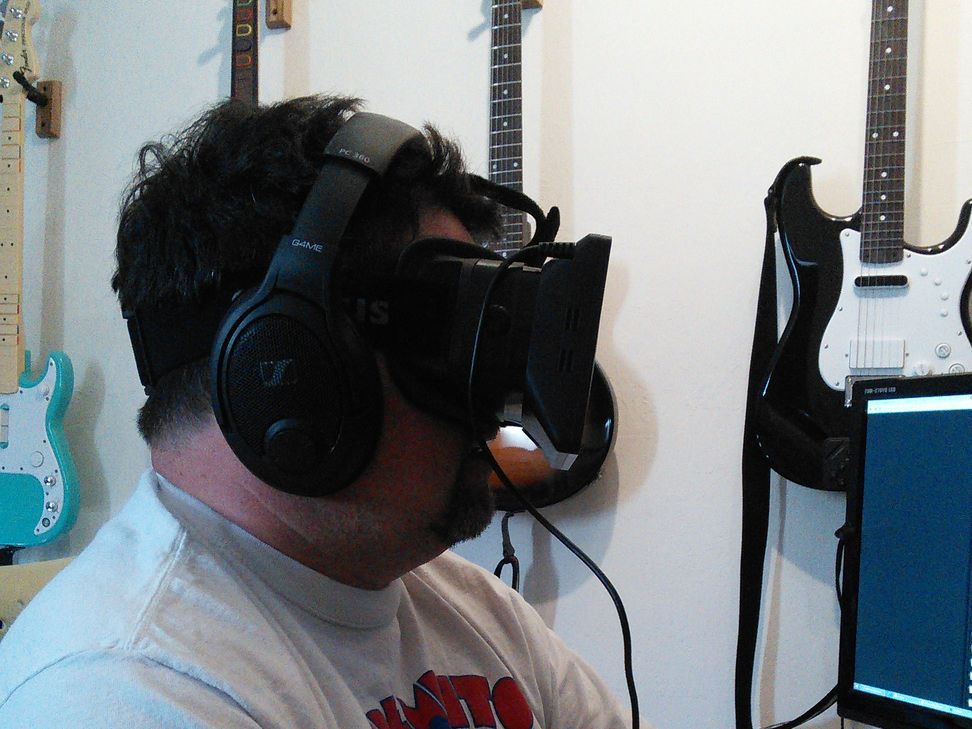
And if you don't find watching me experience my virtual world fascinating (although I can't imagine why) I suppose you can enjoy what's on my screen:
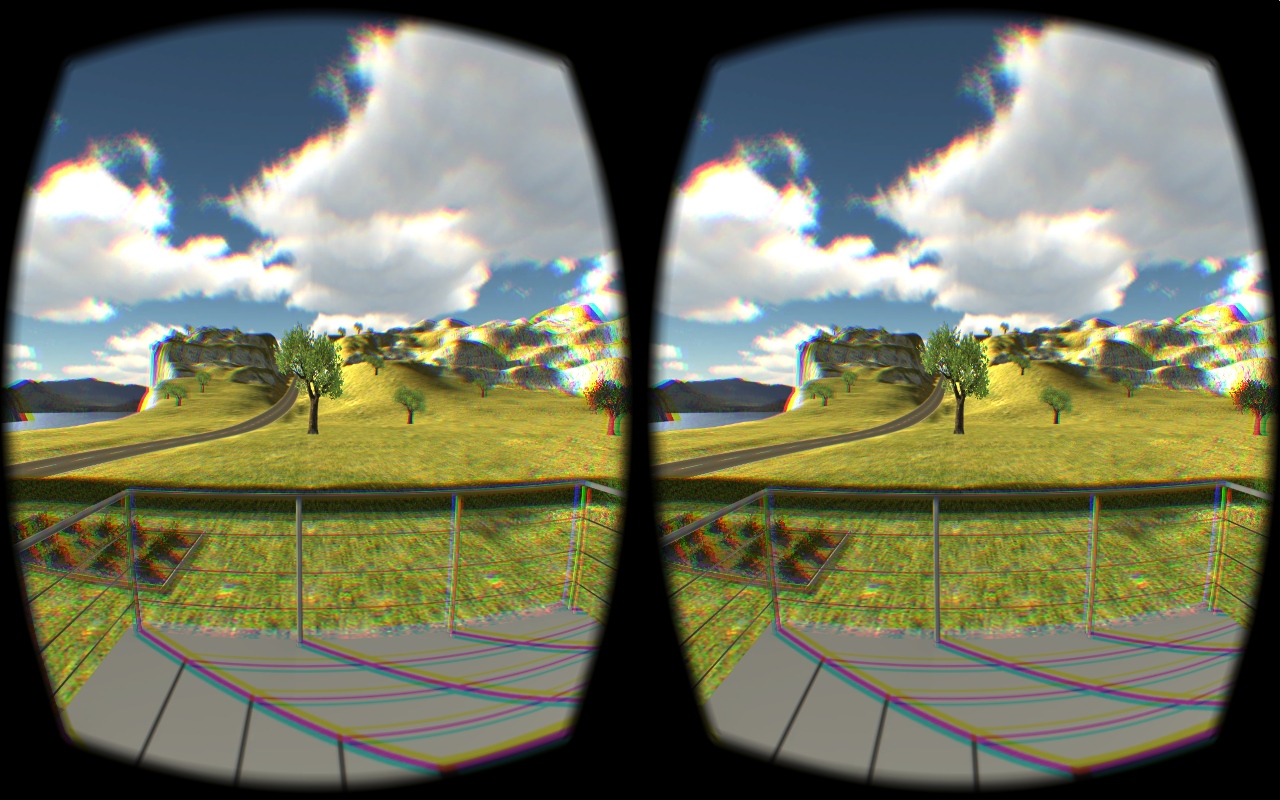
Chroma-shifted, stereographic, fisheye VR gibberish.
I've always been the first kid on my block to recommend an awesome, transformative gaming experience, from the Atari 2600 to the Kinect. I mean, that's kind of who I am, isn't it? The alpha geek, the guy who owned a Vectrex and thought vector graphics were the cat's pajamas, the guy who bought one of the first copies of Guitar Hero in 2005 and would not shut up about it. For that matter I dragged my buddies to a VR storefront in Boulder, Colorado circa 1993 so we could play Dactyl Nightmare. And I have to say, in my alpha geek opinion, modern VR has a long way to go before it'll be ready for the rapturous smartphone levels of adoption that media pundits imply is a few months away.
I apologize if this comes off as negative, and no, I haven't tried the magical new VR headset models that are Just Around The Corner and Will Change Everything. I'll absolutely try them when they are available. Let me be clear that I think the technical challenges around VR are deep, hard, and fascinating, and I could not be happier that some of the best programmers of our generation are working on this stuff. But from what I've seen and experienced to date, there is just no way that VR is going to be remotely mainstream in 5 years. I'm doubtful that can happen in a decade or even two decades, to be honest, but a smart person always hedges their bets when trying to predict the future.
I think the current state of VR, or at least the "strap a nice smartphone or two on your face" version of it, has quite a few fundamental physical problems to deal with before it has any chance of being mainstream.
It should be as convenient as a pair of glasses
Nobody "enjoys" strapping two pounds of stuff on their face unless they are in a hazardous materials situation. We can barely get people to wear bicycle helmets, and yet they are going to be lining up around the block to slap this awkward, gangly VR contraption on their head? Existing VR headsets get awfully sweaty after 30 minutes of use, and they're also difficult to fit over glasses. The idea of gaming with a heavy, sweaty, uncomfortable headset on for hours at a time isn't too appealing – and that's coming from a guy who thinks nothing of spending 6 hours in a gaming jag with headphones on.
For VR to be quick and easy and pervasive, the headset would need to be so miniaturized as to be basically invisible – akin to putting on a cool pair of sunglasses.
Maybe current VR headsets are like the old brick cellphones from the 90's. The question is, how quickly can they get from 1990 to 2007?
It should be wireless
The world has been inexorably moving towards wireless everything, but in this regard VR headsets are a glorious throwback to science fiction movies from the 1970s. Your VR headset and everything else on it will be physically wired, in multiple ways, to a powerful computer. Wires, wires, everywhere, as far as your eyes … can't see.
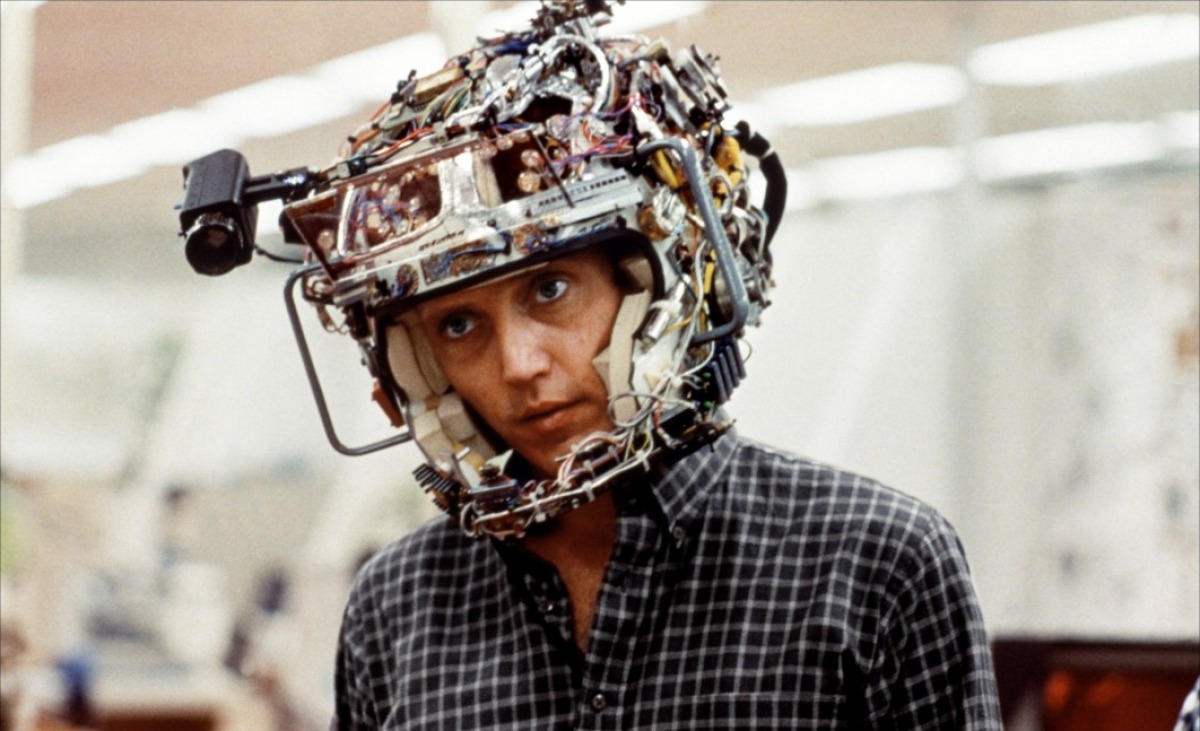
Even the cheaper VR headsets that let you drop a high end smartphone in for a limited VR experience have to be wired to power, as phone batteries are not built for the continuous heavy-duty CPU and GPU rendering that VR requires. Overheating is a very real problem, too.
Wireless video is hard to do well, particularly at the 1440p resolutions that are the absolute minimum for practical VR. On top of that, good VR requires much higher framerates, ideally 120fps. That kind of ultra low latency, super high resolution video delivered wirelessly, is quite far off.
It should have 4k resolution
Since the VR device you're looking at is inches from your eyes – and the resolution is effectively divided in half for each eye (there are a few emerging VR headsets that use two smartphones here instead of one) – an extremely high resolution screen is needed to achieve effective visual resolutions that are ancient by modern computer standards.
The Oculus DK1 at 720p was so low resolution that I consider it borderline unusable even as a demo unit. I'd estimate that it felt roughly DOOM resolution, or 320×240.
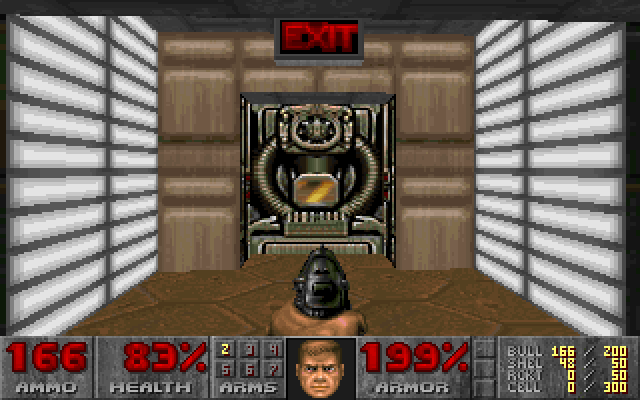
The DK2 at 1080p was marginally better, but the pixelation and shimmer was quite bad, a serious distraction from immersion. It felt roughly Quake resolution, or 640×480.

I know many upcoming VR devices are 1440p or 2560×1440. I strongly suspect that, in practice, is going to feel like yet another mild bump to effective 1024×768 resolution.
I'm used to modern games and modern graphics resolutions. Putting on a VR headset shouldn't be a one-way ticket to jarring, grainy, pixelated graphics the like of which I haven't seen since 1999. There are definitely 4k smartphones out there on the horizon which could solve this problem, but the power required to drive them, by that I mean the CPU, GPU, and literal battery power – is far from trivial.
(And did I mention it needs to be a minimum of 60fps, ideally 120fps for the best VR experience? I'm pretty sure I mentioned that.)
Still, the 4k resolution problem is probably the closest to being reasonably solved on current hardware trajectories in about five years or so, albeit driven by very high end hardware, not a typical smartphone, which brings me to …
It should not require a high end gaming PC or future gen console
VR has massive CPU and GPU system requirements, somewhat beyond what you'd need for the latest videogames running at 4k resolutions. Which means by definition cutting edge VR is developed with, and best experienced on, a high end Windows PC.
Imagine the venture capitalists who invested in Oculus, who have probably been Mac-only since the early aughts, trying to scrounge together a gaming PC so they can try this crazy new VR thing they just invested in. That's some culture shock.

Current generation consoles such as the Xbox One and PS4 may be fine with (most) games running at 1080p, on the PS4 at least, but they are both woefully under-specced to do VR in both GPU and CPU power. That's bad news if you expect VR to be mainstream in the lifetime of these new consoles over the next 5-8 years, and were counting on the console market to get there.
VR on current generation consoles will be a slow, crippled, low resolution affair, about on the level of the Oculus DK2 at best. You'll be waiting quite a while for the next generation of consoles beyond these to deliver decent VR.
Hands (Gloves?) must be supported
I was extremely frustrated by the lack of control options in the Oculus DK1 and DK2. Here I was looking around and exploring this nifty VR world, but to do anything I had to tap a key on my keyboard, or move and click my mouse. Talk about breaking immersion. They bundle an Xbox controller with the upcoming Rift, which is no better. Experiencing VR with a mouse is like playing Guitar Hero with a controller.
The most striking thing about the Survios demo rig I tried was the way I could use my hands to manipulate things in the VR world. Adding hands to VR was revelatory, the one bit of VR I've experienced to date that I can honestly say I was blown away by. I could reach out and grab objects, rotate things in my hands and move them close to my face to look at them, hold a shotgun and cock it with two hands, and so forth. With my hands, it was amazing. The primary controllers you should need in VR are the ones you were born with: your hands.
A virtual world experienced with just your head is quite disappointing and passive, like a movie or an on-rails ride. But add hands, and suddenly you are there because you can now interact with that VR world in a profoundly human way: by touching it. I could see myself playing story exploration games like Gone Home in VR, if I can use my hands – to manipulate things, to look at them and open them and turn them in my hands and check them out. It was incredible. Manipulating that world with my hands made it infinitely more real.
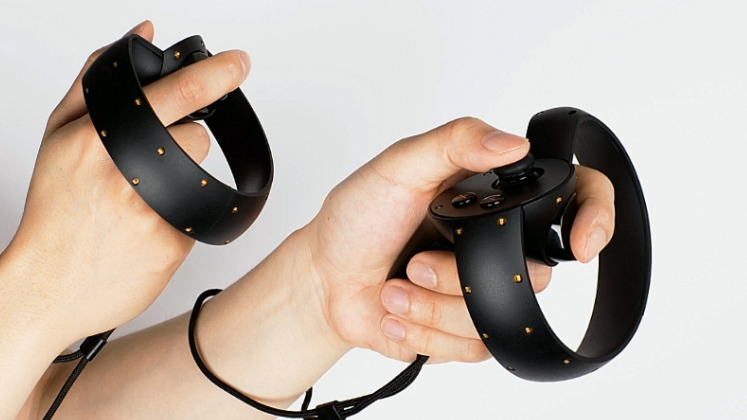
The good news is that there are solutions like Oculus Touch. The bad news is that's it's not bundled by default, but should be. This device tracks hand position, plus rotation, and adds some buttons for interaction. Even better would be simple gloves you could wear that visually tracked each finger – but sometimes you do need a button, because if you are holding a gun (or a flashlight) you need to indicate that you fired a gun (or turned on the flashlight) which would be quite hairy to track via finger movement alone.
I'm optimistic that VR and hand control will hopefully become synonymous, otherwise we're locking ourselves into a "just look around you" mindset, which leads to crappy, passive VR that's little more than a different kind of IMAX 3D movie.
It must compete with mature 2D entertainment
I get frustrated talking to people who act like VR exists in a vacuum, that there are suddenly no other experiences worth having unless they happen in glorious stereo 3D.
I've experimented with stereo 3D on computers since the days of junky battery powered LCD shutter glasses. And we all know the world has experienced the glory of 3D television … and collectively turned its head and said meh.
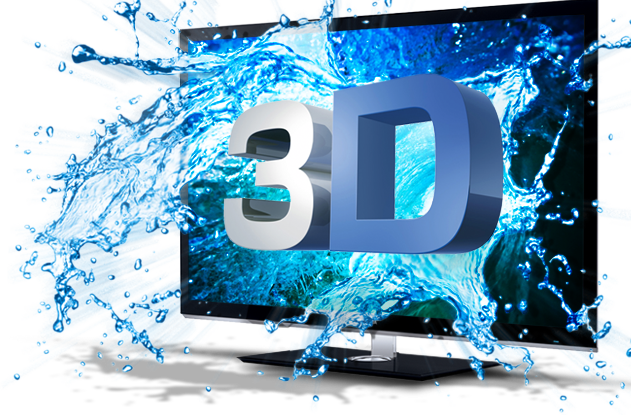
Experiencing something in 3D, in and of itself, is just not that compelling. If it was, people would have scarfed up 3D TVs, see only 3D movies, and play only 3D video games on their PCs and consoles regularly. The technology to do it is there, battle tested, and completely mature. I know because I saw Captain EO at Epcot Center in 3D way back in 1985, and it was amazing thirty years ago!
I recently saw Gravity in IMAX 3D and I liked it, but it didn't transform my moviegoing experience such that I could never imagine seeing another boring flat 2D movie ever again.
People have so many wonderful social experiences gathered around common 2D screens. Watching a movie, watching a TV show, watching someone play a game. These are fundamentally joyous, shared human experiences. For this to work with VR is kinda-sorta possible, but difficult, because:
-
You need a proper flat 2D representation of what the VR user is seeing
-
That 2D representation must be broadcast on the primary display device
VR is ultra resource intensive already, so rendering yet another copy of the scene at reasonable framerates (say, constant 60fps) isn't going to be easy. Or free.
On top of that, the VR user is probably wearing headphones, holding a pair of hand controllers, and can't see anything, so they can't interact with anyone who is physically there very well.
I've had incredible gaming experiences on 2D screens. I recently played Alien: Isolation, or as I like to call it, Pants Crapping Simulator 3000, and I thought it was one of the most beautiful, immersive, and downright goddamn terrifying gameplay experiences I've had in years. I was starring in a survival horror movie – it felt like I was there in every sense of the word.
At no point did I think to myself "this would be better in 3D". In many ways, it would have been worse.
Good God man, do you ever shut up?
Sorry. I had some things to get off my chest with regards to VR. I'll wrap it up.
I apologize, again, if this post seems negative. Writing this, I actually got a little more excited about VR. I can see how far it has to come to match its potential, because the technical problems it presents are quite hard – and those are the most fun problems to attack.
I guess I might be the only person left on Earth who said, hey, I tried VR and it was just OK. I think VR ought to be a hell of a lot better, and has to be if it wants to be truly pervasive.
| [advertisement] At Stack Overflow, we put developers first. We already help you find answers to your tough coding questions; now let us help you find your next job. |